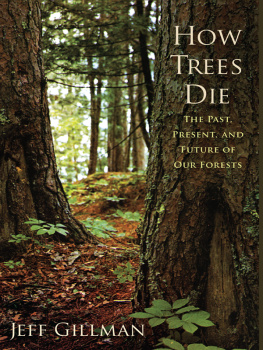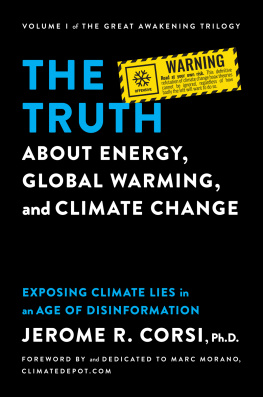HOW THE GOVERNMENT GOT IN YOUR BACKYARD
HOW THE GOVERNMENT GOT IN YOUR BACKYARD
Superweeds, Frankenfoods, Lawn Wars,
and the (Nonpartisan) Truth
About Environmental Policies
JEFF GILLMAN ERIC HEBERLIG
ERIC HEBERLIG

Copyright 2011 by Jeff Gillman and Eric Heberlig.
All rights reserved.
Published in 2011 by Timber Press, Inc.
The Haseltine Building
133 S.W. Second Avenue, Suite 450
Portland, Oregon 97204-3527
www.timberpress.com
2 The Quadrant
135 Salusbury Road
London NW6 6RJ
www.timberpress.co.uk
Printed in The United States of America
Library of Congress Cataloging-in-Publication Data
Gillman, Jeff, 1969
How the government got in your backyard : superweeds, frankenfoods, lawn wars, and the (nonpartisan) truth about environmental policies / Jeff Gillman and Eric Heberlig. 1st ed.
p. cm.
Includes bibliographical references and index.
ISBN 978-1-60469-001-9
1. Environmental policyPolitical aspectsUnited States. 2. Agriculture and stateUnited States. 3. Agriculture and politicsUnited States. 4. Science and stateUnited States. I. Heberlig, Eric S., 1970 II. Title.
GE180.G54 2011
363.705610973dc22
2010028452
A catalog record for this book is also available from the British Library.
For Suzanne,
Catherine, and Clare
Jeff
For Tracy, Colin,
Mena, and Ellie
Eric
Contents
Acknowledgments
WRITING A BOOK takes a lot of effort, even when the work is split between two authors. First we would like to thank our families for allowing us the time to work on this project. Evenings and weekends were all too frequently divided between them and chapter revisions. We need to thank Jay Schaefer for taking this book apart and helping us rebuild it into something better, and Peggy Flanagan for catching errors and cleaning the text up so that it reads smoothly. We would also like to thank the fine people at Timber Press for taking a chance on a book thats a little bit different from what theyre used to, particularly Juree Sondker and Neal Maillet. Jeff is indebted, as always, to Chad Giblin for helping run things while he was busy writing, and also to Eric Watkins, Tom Michaels, Gary Johnson, Alan Smith, and especially Esther McGinnis for their insights into various bits of science used for this book. Eric relied upon Chase Woodall for research assistance.
Introduction
IN A CORNER of Atlanta, a factory quietly relieves itself. Columns of gray smoke billow from its overfull belly, creating the only mark in an otherwise clear blue sky. The population below accepts the factory as a necessary evil. Some people even like the factory, thankful that it provides so many jobs. Some just ignore it. But there is more to the smokestack than meets the eye.
At the top of the tower sits a small box. Invisible to anyone below, the box constantly monitors the tower, day and night, rain or shine. This box tells the people in the factory what comes out of the tower. This box costs a great deal of money to install. It costs a great deal of money to monitor. It will cost a great deal to replace when it breaks, and it will, eventually, break.
The people who run this factory dont want this box in their tower. It slows them down, catches their mistakes, impedes their progress, and costs them time and money. But most of us outside of the factory are happy that the box is there. We like to know that the factory keeps tabs on the waste that exits the towerwaste that could cause acid rain and global warming, potentially devastating our environment and ruining our health. We like to know that if something is wrong the factory will shut down. We like to think that this makes our lives better. But does it?
In Iowa, stalks of corn grow tall in a field that stretches as far as the eye can see. A farmer sighs and smiles, happy that his plants are strong and prices are good. He didnt have to spray for insects at all this year, thanks to the seed he planted, which contained new genes that scientists have introduced into the corn, and for which the farmer paid extra money. The fact that he used this corn also means that he wont be able to save any seed from the corn he grew this year to replant next year. He is confident that having the cure to what were once devastating insect problems is worth it. But is this farmers cure worse than the problem it solves?
In a suburb of Charlotte, North Carolina, a young mother walks into a supermarket intent on purchasing some vegetables for dinner. Her eyes scan to the right and to the left while she picks up a bag to hold the tomatoes she has selected. And then she stops and puts them back. There, just down the aisle, is a bin labeled USDA Organic. She goes over and selects some fine-looking produce, happy that she has avoided exposing her children to carcinogenic pesticides. But has she?
In a Philadelphia suburb, a man enters a nice two-story home and closes the door tightly behind him. He greets his wife, takes out the garbage, and checks the messages on his answering machine. Hearing nothing of consequence, he continues his evening ritual. Entering the basement, he is enveloped by a bright light emanating from a far corner. Walking down the steps he notes how splendidly his crop is growing. There is a constant hum as water and nutrients are pumped into and out of horizontally oriented tubs set against a far wall. Hanging from the ceiling above the tubs is a row of high-intensity lights providing the energy for the crop whose roots dwell in a nutrient solution while its leaves reach for this artificial sun. Only a weed could prosper so well on this herbal equivalent of life support; and weed is exactly whats growing here, forced into this dungeon because the outside world doesnt want it around. But is the world singling out this plant unfairly?
For almost 250 years, our government has been involved in making laws that govern the way we live. These laws are intended to make our lives better, our society richer, and our planet safer. Many of these laws are consistent with common sense: dont kill anybody and dont take property that doesnt belong to you. But some are a little kooky: in Pennsylvania its illegal to sing in the bathtub, and in New Hampshire you cant sell the clothes youre currently wearing to pay off a gambling debt. With some laws its immediately obvious that they will have a positive impact, but with others it takes years to discover what their impact will be. Indeed, even after a laws consequences have been realized some people may still argue whether the law had a negative or a positive effect on our society (do Pennsylvanians benefit or suffer from their lack of bathtub singing?). Governmental policies that deal with our environment almost invariably fall into the latter category. It is the government that requires towers to have apparatus for measuring emissions. It is the government that certifies food as organic. It is the government that restricts the growth and sale of genetically modified plants. And it is the government that restricts growing certain plants at all. Are these policies helpful or harmful to our society and environment? There is no single answer, and that, in a nutshell, is what this book is about.
As the government conducts its business, righting our environmental wrongs and helping the economy in the process, something is often lost in the mix: how all these changes affect us, the citizens. This is a shame, because when it comes right down to it, its our backyards, lawns, gardens, and even dinners that are at the center of the environmental debate. Something as obscure as how plant patent laws are written and interpreted can affect whether youre eating genetically modified corn tonight. If the government restricts pesticide use, its going to be your backyard that is covered with dandelions. If you live in a neighborhood with restrictions on what constitutes an acceptable lawn, you could go to jail for letting yours die. There is no escaping governmental control. If we dont appreciate and understand where this control comes from, then were not going to be able to do anything about it.
Next page








 ERIC HEBERLIG
ERIC HEBERLIG